Cat Mom Cries Out As She Doesn't Know How To Stop Husband From Fat-Shaming Her Cat
Cats are living longer and in better condition these days, largely due to the tremendous advancements in veterinary science over the past few years. However, there is a drawback to this: cats are more likely to develop some form of cancer as they age.
Given the dire prognosis, a terminally ill cat's owner must decide how to provide the beloved pet with the best care possible in the latter weeks, months, or even years of its life. This presents a difficult and heartbreaking issue.
The key difficulty is keeping the cat as comfortable and happy as possible in its final days while also ensuring that its physical health is preserved to the greatest extent feasible in light of its tragic condition. It often happens that a cat with cancer will lose weight and not eat adequately.
As a result, the owner must speak with a veterinarian about the best course of action for handling this issue. OP's cat has terminal cancer and is losing weight.
The vet advised the OP to feed her lactose-free heavy cream and a lot of treats to prevent her from starving. The cat has gained a little weight again, but her husband constantly calls her fatty, fat-butt, horse-butt, fatty-catty, and so on.
The OP doesn't like this, and she explains why as the story progresses.
The headline

The OP kicks off her story
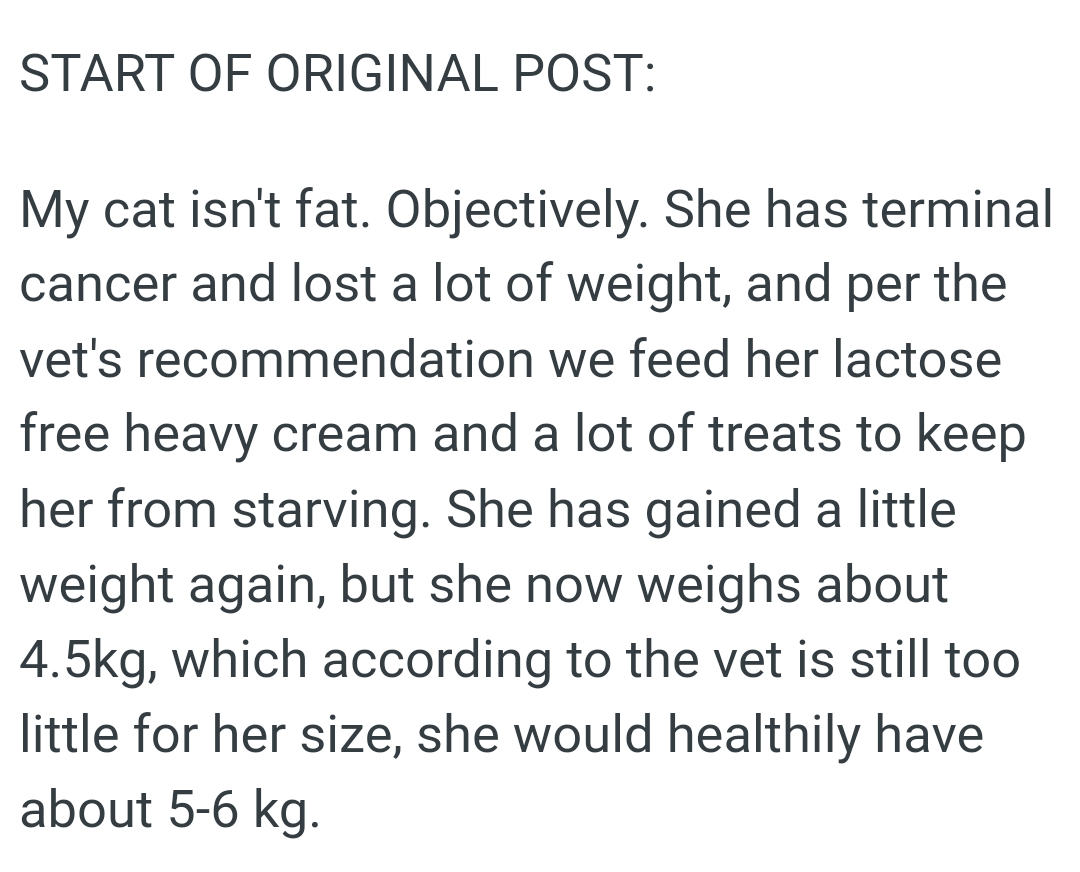
The Impact of Emotional Support on Pet Owners
Research indicates that pets often serve as emotional support for their owners, significantly affecting their mental health.
Dr. Allen McGowan of the University of California notes that pet ownership can enhance emotional well-being, but negative comments about a beloved pet from close family members can create distress.
This situation highlights the importance of understanding and respecting the emotional bonds people share with their pets.
He says the cat doesn't understand it
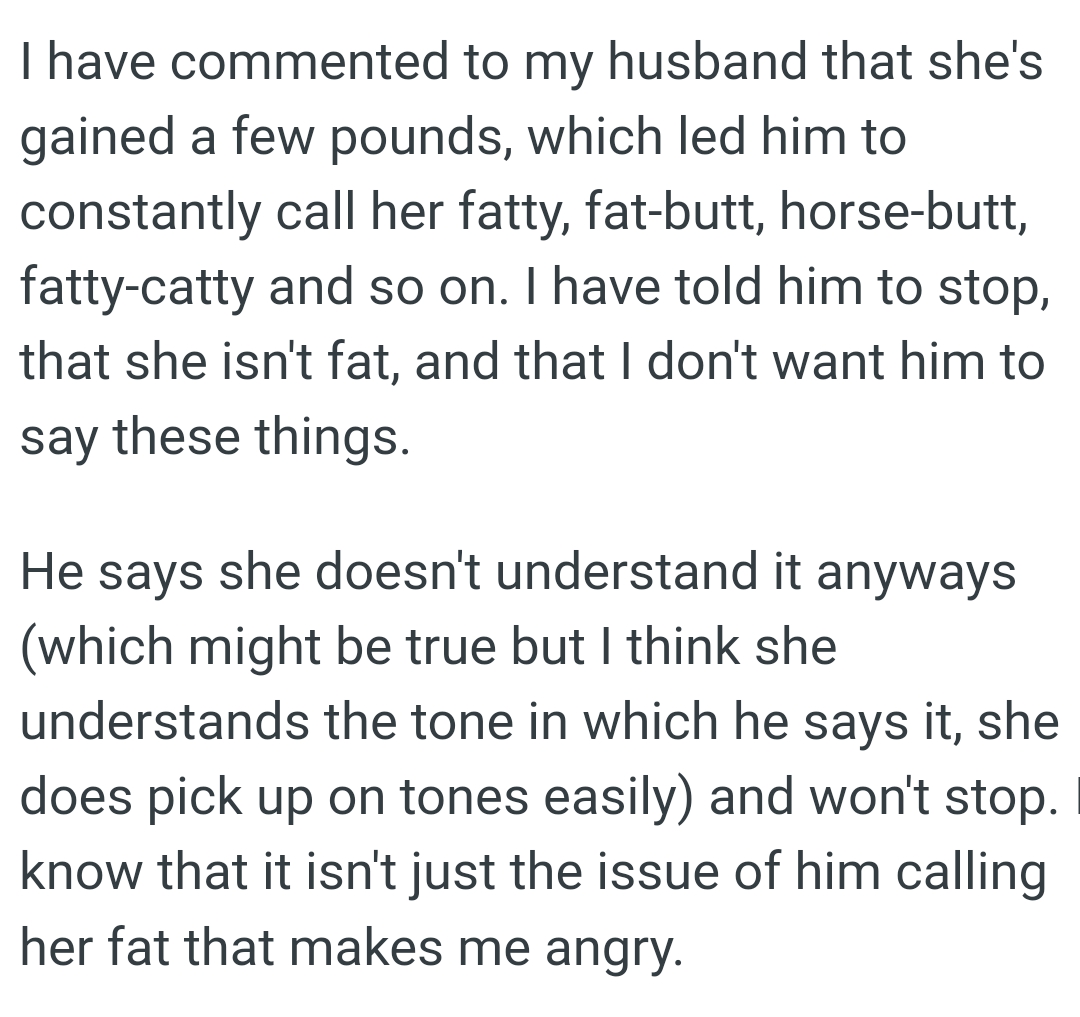
He says the exact things her dad called her

The Reddit post received hundreds of comments, and here are some of the most upvoted ones.
From someone who is guilty of the same crime

The OP isn't over her experience.
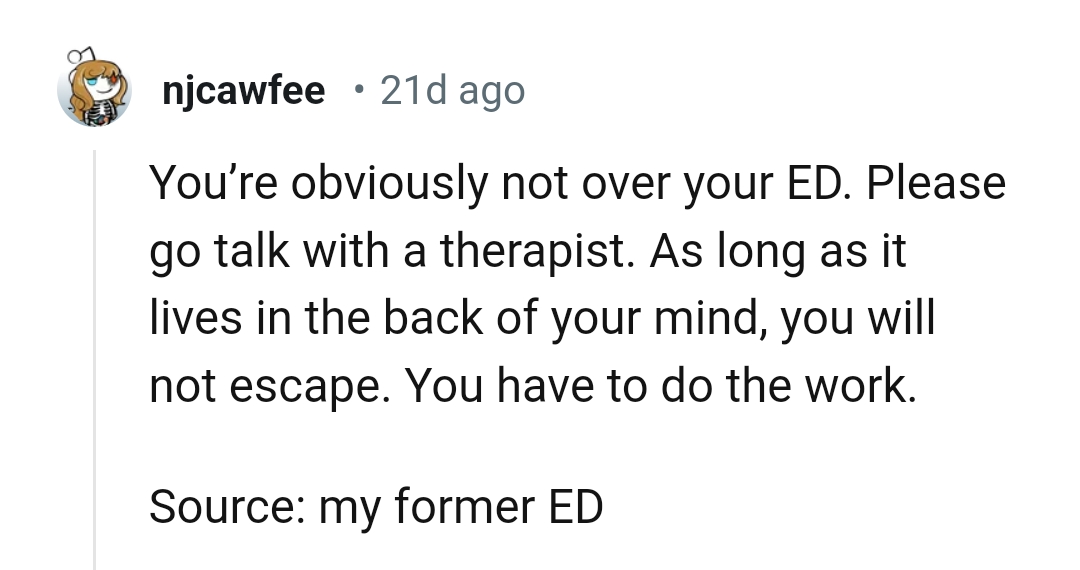
Studies show that when partners engage in fat-shaming behavior, it can lead to feelings of shame and inadequacy not only for the pet but also for the owner.
According to research published in the American Journal of Psychology, this dynamic often results in increased tension and conflict within relationships, as the affected party feels their values and emotional connections are being invalidated.
Cats can pick up a tone
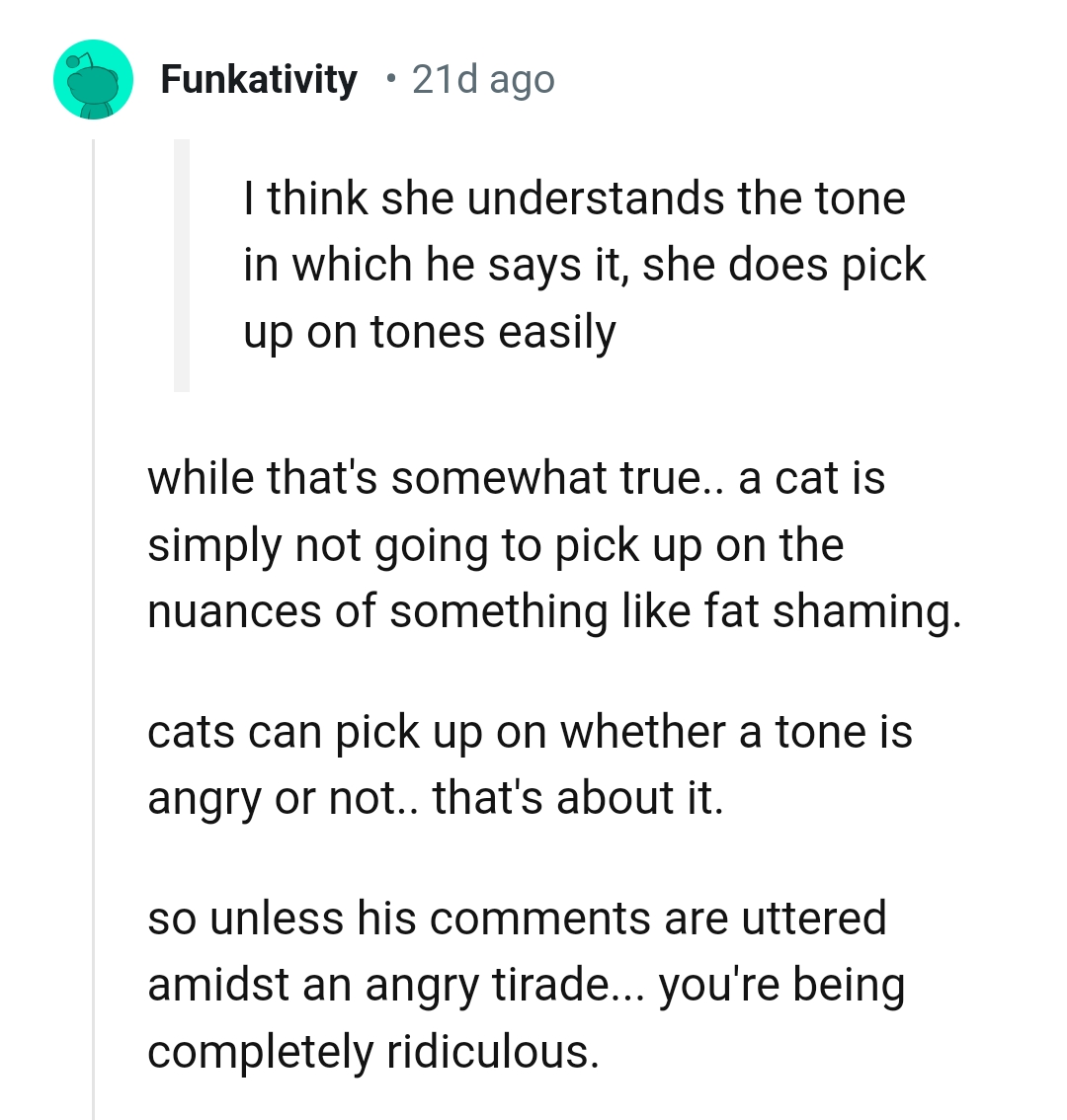
It's about the words that he used
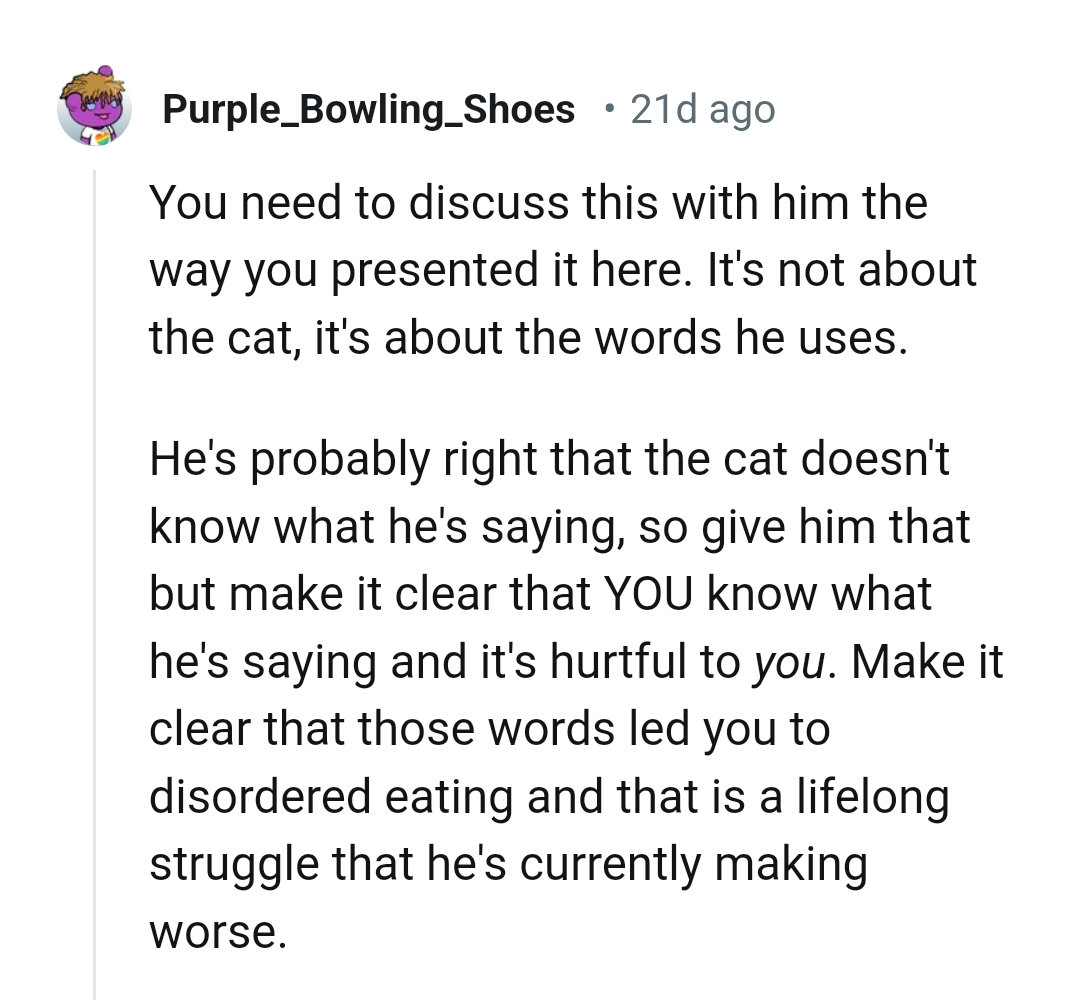
The OP left this edit to further clarify things
My use of "adipose" stems from the fact that I am German, and it describes a specific weight-height relation in German. I didn't know that wasn't universal.
I am in therapy. My father physically and psychologically abused me for 21 years; it's not that easy to overcome, as some of you might think.
My cat is closely monitored by her vet; as soon as she is in any amount of pain or discomfort, we will discuss putting her down. Right now, she is as happy as can be and not experiencing pain, as far as we can see, so we try to make her last weeks/months as nice as possible.
These terms are upsetting to the OP

This isn't something to be angry about
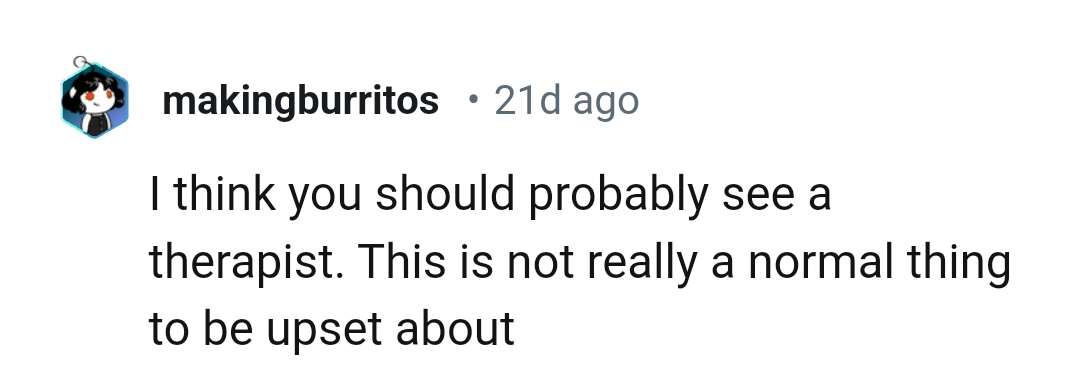
Navigating Conflicts in Pet Care
To address these conflicts, it's essential for partners to engage in constructive dialogues about their differing perspectives on pet care.
Psychologists recommend using 'I' statements to express feelings without assigning blame, which can help foster understanding and empathy.
For instance, saying 'I feel hurt when I hear negative comments about my cat' can open a dialogue without escalating to defensiveness.
The OP needs to talk to a therapist
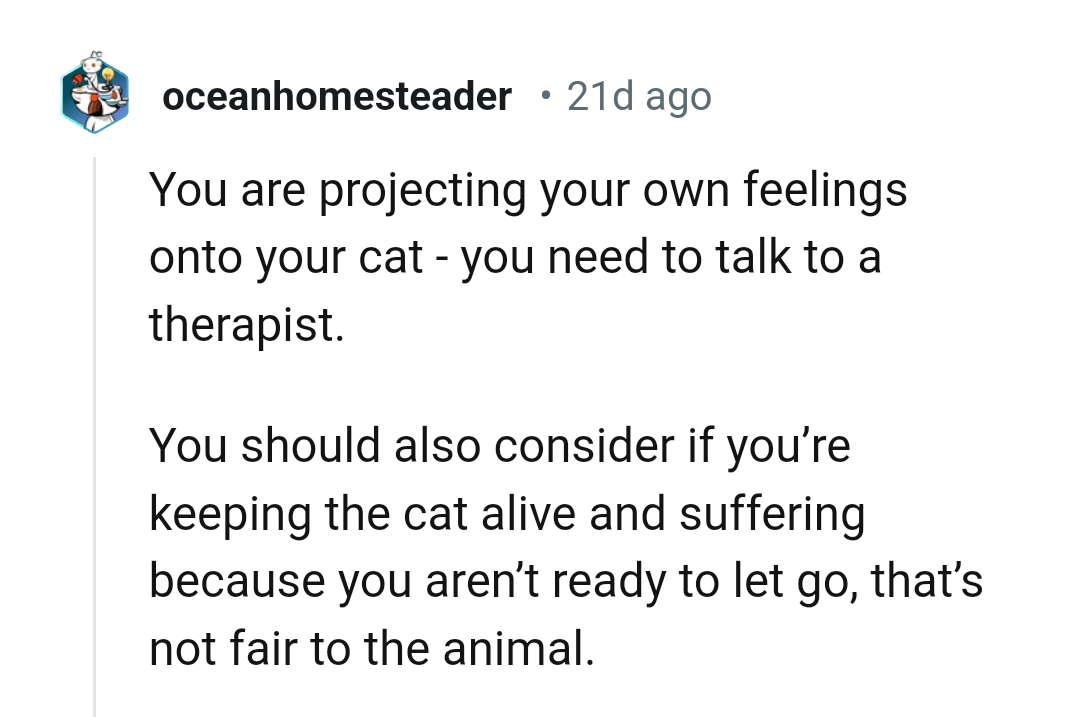
Thinking of what's best for the cat

Additionally, involving both partners in pet care decisions can enhance cooperation and shared responsibility.
Research in relational dynamics suggests that collaborative decision-making can strengthen bonds and promote a sense of partnership, particularly when it comes to caring for pets, who are often viewed as family members.
Psychological Analysis
This conflict illustrates how deeply personal relationships with pets can impact our interactions with significant others. It's important for both partners to recognize the emotional weight these relationships carry and approach discussions with empathy.
Effective communication that validates each other's feelings is crucial in resolving disagreements and promoting a supportive environment for both the pet and the relationship.
Analysis generated by AI
Analysis & Alternative Approaches
In summary, fostering respect and understanding in discussions about pets can strengthen relational bonds.
By employing communication strategies that prioritize emotional safety, partners can navigate disagreements more effectively, ensuring that their relationships with each other and their pets remain healthy and supportive.
Ultimately, creating a respectful dialogue about differing views on pet care is essential for maintaining harmony in the home.
Many Redditors recommended enrolling in intensive counseling, as it is clear that the OP has not resolved her unhealthy connection to food and her body. It's now being revealed against her partner, and it is a serious problem, as the OP is blaming her partner for it all as a way to mask her fears.
Redditors say that this is entirely about her and her partner and has nothing to do with the cat. Drop your thoughts about this story in the comments section below.
Understanding the psychological impact of pet-related discussions is crucial for maintaining harmonious relationships.
Dr. Karen O'Leary from the University of Toronto emphasizes that acknowledging the emotional significance of pets can lead to more sensitive interactions between partners.
Recognizing that the emotional bond with a pet can mirror deeper relational dynamics is key to resolving conflicts surrounding their care.



